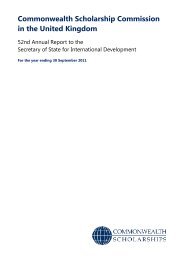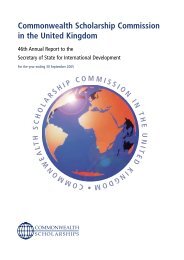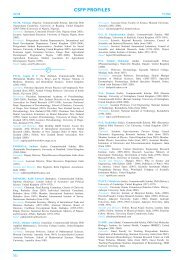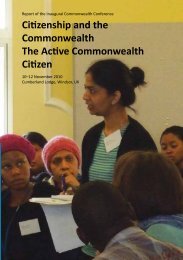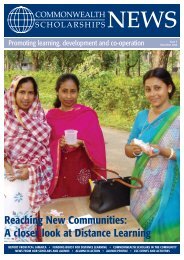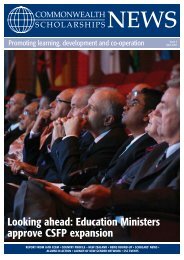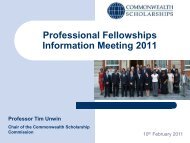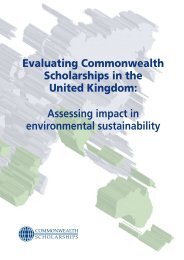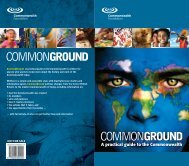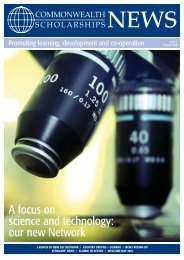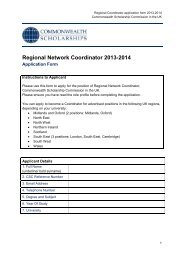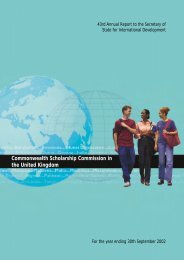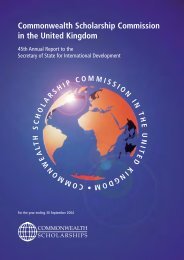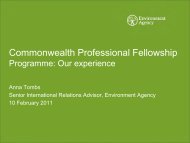40th Annual Report (1998-1999) - Commonwealth Scholarship ...
40th Annual Report (1998-1999) - Commonwealth Scholarship ...
40th Annual Report (1998-1999) - Commonwealth Scholarship ...
- No tags were found...
You also want an ePaper? Increase the reach of your titles
YUMPU automatically turns print PDFs into web optimized ePapers that Google loves.
COMMONWEALTH SCHOLARSHIP COMMISSION IN THE UNITED KINGDOMCHAIRMANDr Geoffrey Caston CBEFormerly Vice-Chancellor of the University of the South PacificDEPUTY CHAIRMANProfessor Berrick Saul CBEFormerly Vice-Chancellor of the University of YorkCOMMISSIONERSMr. Suhail AzizProfessor J. B. DilawariDr. David FusseyMr. Colin GeorgeProfessor Trudy HarphamProfessor William Hill FRSProfessor Ian LivingstoneMrs. Anne LonsdaleProfessor David LuscombeFBAChairman and Managing Director, Brettonwood Partnership Ltd.,International Management ConsultantsConsultant Physician and Gastroenterologist, Inverclyde RoyalHospitalVice-Chancellor of the University of GreenwichFormerly Group Personnel Director of Guinness plc., andChairman of the Lifelong Learning FoundationDepartment of Urban Development and Policy, South BankUniversity.Professor of Animal Genetics, University of EdinburghProfessor of Development Studies, University of East Anglia;President of New Hall, University of CambridgeLeverhulme Personal Research Professor of Medieval History,University of SheffieldDame Bridget Ogilvie DBE Director, The Wellcome Trust; to July <strong>1999</strong>Professor John PendryFRSProfessor of Theoretical Solid State Physics, Imperial College ofScience and Technology, University of LondonOFFICERSExecutive SecretaryAssistant SecretaryDr John KirklandDirector of Human Capacity DevelopmentAssociation of <strong>Commonwealth</strong> UniversitiesDr Jonathan JenkinsHead of AwardsAssociation of <strong>Commonwealth</strong> Universities
CONTENTSINTRODUCTION & OVERVIEW 2HOW DOES CSFP WORK? 4CSFP IN PRACTICE 7Safeguarding the Bangladesh Water SupplyMeasuring Aluminium in the BodyTropical Medicine: A Partnership with IndiaAustralian Student is one in a ThousandUnderstanding local interests in BotswanaNew Vision for Mobile PhonesUnlocking Natural Potential in the South PacificRECRUITMENT & SELECTION 12MONITORING PROGRESS 14THE AWARD HOLDER’S VIEW 15NEW INITIATIVES FOR THE NEWMILLENNIUM 16KEEPING IN TOUCH 17CSFP OUTWARD COMPETITION 18CSFP FINANCES 19NEW AWARDS FOR <strong>1999</strong> 20Applications, Nominations & SelectionsParticipation by UK InstitutionScholars by Country, Subject and Year of EntryAWARDS HELD DURING <strong>1998</strong>-99 26Participation by UK InstitutionAwards by Country, Subject and Year of EntrySubmission Rates by InstitutionCSFP PEOPLE 33Graduating StudentsPanel of AdvisersHOW TO APPLY 42
INTRODUCTION & OVERVIEWWe have the honour to submit, pursuant to section15 (12) of the Overseas Development and CooperationAct 1980, the following report of the<strong>Commonwealth</strong> <strong>Scholarship</strong> Commission in theUnited Kingdom for the year ending 30 September<strong>1999</strong>.<strong>1999</strong> represents a milestone for the Commission,since our intake will be the fortieth since thescheme began. Judging by the numbers ofapplicants and the enthusiasm of students, theprogramme remains as popular and prestigious asever. This was reflected during the year by asignificant increase in funding from the Departmentfor International Development.But, as our <strong>Report</strong> last year noted, there is acontinuing need for new contributions and newideas if this special contribution to the professionaland intellectual life of the <strong>Commonwealth</strong> is to bemaintained. This need has been at the heart of ouractivities during the year. Our efforts can besummed up under the headings of Accountabilityand Innovation.AccountabilityConscious of the need to demonstrate value formoney, the Commission has put in place measuresto evaluate our performance at all levels. For thefirst time, in the summer of <strong>1999</strong>, award holderswere surveyed to establish their views on mattersranging from academic supervision and facilities toadministration of the scheme and their generalexperience of living in the United Kingdom.Results of the exercise are given on page 15.In <strong>1998</strong>, the Commission also published for the firsttime submission rates of its doctoral students,compared with those of the UK Research Councils.This has been repeated in <strong>1999</strong>, and the results aregiven on page 14. Although there is a small declinein submissions within four years compared to lastyear, we are pleased to note that rates still comparewell with Research Council equivalents; which is nomean achievement given the difficulties whichoverseas students inevitably face in adjusting to lifein a foreign country.Whilst continuing to regard academic quality as themain criterion in selection, the Commission alsopublishes its performance in other areas, mostnotably gender and geographical distribution. TheseMembers of the Commission pictured at the <strong>1999</strong> Welcome Dayare discussed on pages 12 and 13.Finally, we should record that neither Commissionmembers nor officers have been exempt from thespirit of accountability. This summer, theCommission gave formal approval to a new code ofconduct, covering issues such as receipt of gifts.For our officials at the Association of<strong>Commonwealth</strong> Universities and British Council,<strong>1998</strong>-99 was the first full year of operation underthe Memorandum of Understanding which definesprecise performance targets. It has been agreed thatthese targets will be subject to review after a twoyearperiod. Copies of both documents can beobtained from the Commission at the address on theinside back cover.InnovationThe year has also seen increased efforts to broadenthe range of schemes on offer. It has seen the firsteight recipients on our split-site PhD scheme inplace, and a further seventeen selected for awards inthe coming year (page 16). We believe that thescheme offers immense potential, in strengtheningexisting collaboration between universities andopening up the possibility of doctoral study in theUnited Kingdom for those unable to spend threeyears away from home. It is also cost effective. Inthe current year, we expect to extend the concept tojointly taught Masters programmes.Another area of development has been the efforts totrace alumni of the programme (page 17). Thus far,some 2,000 contacts with former Scholars andFellows have been established with some certainty,including at least one Head of State, several cabinetministers and some 30 university Vice-Chancellors!We remain aware, however, that much has to be2
done before a proper quantitative analysis can becontemplated, and this will be a priority for thecoming year. In a related activity, planning alsostarted during the year for measures to help currentFellows maintain good relationships with the UK ontheir return home. This has since borne fruit in aseminar on collaborative funding opportunities,which took place in December <strong>1999</strong>.GEOFFREY CASTON CBECHAIRMANManagement and PersonnelDr Geoffrey Caston has continued to serve asChairman of the Commission throughout the year,whilst Professor Berrick Saul has served as DeputyChairman, with special responsibility forsupervising the selection process. The only changein membership during the year is the retirement ofDame Bridget Ogilvie, after serving two terms, towhom grateful thanks are extended. A full list ofCommissioners appears on the inside front cover.JOHN KIRKLANDEXECUTIVE SECRETARYManaging the scheme is, however, very much ateam effort. It relies critically on the help andefficiency of nominating agencies in no less than 54countries and dependencies, and of some 125Academic Advisers in the UK, all of whom areeminent in their respective fields, who give theirtime in reviewing applications. To these, andcolleagues at Association of <strong>Commonwealth</strong>Universities (who provide the Secretariat for thescheme) and British Council, we also extend ourgratitude.The most important people in the entire process,however, are the Scholars and Fellows themselves.This year, our report reflects this more than everbefore by including a selection of examples of howtheir work is not only of the highest academicstandard, but is directly relevant to the developmentproblems of their own countries, and involvesresearch and training at the leading edge oftechnology. It is in work such as this that thegreatest justification for the continued growth of theprogramme lies.On behalf of the CommissionA team effort: ACU and British Council staff pictured together3
study is restricted to nominees from the Seychelles,Maldives, St Helena and the Falkland Islands. Ourdevelopmental/regional quotas give 45% of awardsto sub-Saharan Africa, 30% to South Asia and theremaining 25% to the rest of the <strong>Commonwealth</strong>.Awards Reserved for University Staff in theDeveloping <strong>Commonwealth</strong>These are intended to help the institution buildingprocess in the developing <strong>Commonwealth</strong> byincreasing the indigenous skills base, and candidatesare nominated in connection with a specific teachingpost which they will take up or resume oncompletion of their studies. The Commissionconsiders its contribution to institution building tobe the most effective way of enhancing andmultiplying the benefits of scholarship. Candidatesare nominated by the Executive Heads of theiremploying universities (or institutions ofcomparable standing). By special agreement, thenomination of candidates from the countries ofSouth Asia is, in each case, co-ordinated by theappropriate higher education authority.Within the guidelines for these awards, theCommission wishes to take advantage of universityand departmental links between institutions in theUnited Kingdom and those in the developing<strong>Commonwealth</strong>. It also wishes its awards to beused to engender or strengthen such links and thusto enhance international co-operation in highereducation.Academic Staff <strong>Scholarship</strong>sThe Commission reserves 22.5% of the availableresource from DfID for this category of award. Theawards are offered on terms identical to those ofGeneral <strong>Scholarship</strong>s with the same emphasis onacademic excellence; they are available only to thejunior academic staff of those universities incountries of the developing <strong>Commonwealth</strong> needingto seek training at master's and doctoral leveloutside the home country. Whilst a regional balanceis sought, there are no masters/doctoral quotas.Through these awards the Commission hopes tobuild a cadre of trained researchers and teacherswho will be better able to carry out their duties, andbuild the necessary foundations for effectivepostgraduate (as well as undergraduate) work withinthe countries concerned. This will assist the longterm sustainability of the economies of the countriesby allowing the throughput of more and bettertrained students through the system and into thewider world.<strong>Commonwealth</strong> Fellowships17.5% of available resource from DfID is reservedfor this category of award. Candidates from alldisciplines, including Medicine and Dentistry, maybe considered and it is hoped that the scheme willoffer overseas institutions support in theirdevelopment plans, providing an important sourceof training and exchange of information. TheCommission also aims to promote the personaldevelopment of academics (and administrators) byalleviating the sense of isolation and stagnationwhich often drives many to leave their countries andthus retards development.The awards are offered for either six or twelvemonths’ duration, with the additional possibility ofsix months in the UK with one year back home,followed by another six months in the UK.AWARDS OUTSIDE THE UKThe Commission also has responsibility fornominating British students to accept scholarshipsmade available by other <strong>Commonwealth</strong> countriesunder the scheme. At present, there are eightparticipating nations — Brunei, Canada, India,Jamaica, New Zealand, Sri Lanka, Trinidad andUganda. A particularly welcome developmentduring the year was the notice given by theUniversity of the South Pacific that they intended tooffer such a scholarship for the first time, in 2000.5
The <strong>Scholarship</strong>s, especially those offered byCanada, continue to be intensely popular and theSecretariat deals each year with several thousandenquiries for details of awards tenable overseas. Inthe report year 103 full applications were receivedin the Secretariat by the closing date at the end ofOctober, and were first reviewed by one or anotherof the Commission’s panel of advisers. Followingthe normal practice, panels of CommissionMembers interviewed for each country roughlytwice as many candidates as Britain had beeninvited to nominate. The task of producing thisshortlist presented serious problems of priorselection, given the high quality of the candidates.Forty one candidates were nominated to sixawarding countries.There has been a slight decrease in the number ofapplications compared to last year. The use of thepreliminary screening procedure must play a part inthis reduction, as must the continued absence ofAustralia in the list of countries invitingnominations from the United Kingdom. Awardstenable in New Zealand continue to be funded bythe New Zealand universities themselves.If the CSFP is to remain the "flagship of<strong>Commonwealth</strong> co-operation in education", asMinisters of Education wish it should, it isimportant that more and more <strong>Commonwealth</strong>countries follow the British example of support forit. The Commission will do what it can to encouragethis, and there are some signs of success, especiallyamong developing countries in offering scholarshipsthemselves.MANAGEMENT OF THE SCHEMEThe Commission Secretariat is provided by theAssociation of <strong>Commonwealth</strong> Universities. Itsresponsibilities include supporting theadministrative work of the Commission,co-ordination of the selection process, monitoringand all other matters of an academic nature. Thelocation of the Secretariat within the ACU gives theCommission access to a rich academic networklinking almost five hundred universities across all<strong>Commonwealth</strong> countries. Dr John Kirkland,Director of Human Capacity Development at ACU,acts as Executive Secretary to the Commission, andDr Jonathan Jenkins, Head of the ACU AwardsSection, as Assistant Secretary.Non-academic support for grant holders is providedby the British Council. This includes pre-departurebriefings for award holders from some countries,travel arrangements and reception on arrival in theUK. The Council also provides a specialist welfareservice for Scholars and Fellows in the UK, and isresponsible for financial matters, including thepayment of awards, subsequent accounting andbudget forecasting.Contact details for the Secretariat, and nationalnominating agencies, can be found at the end of this<strong>Report</strong>.JOINT INITIATIVESA particular priority of the past year has been thedevelopment, on an experimental basis, of schemesof study provided jointly between UK universitiesand those in the developing <strong>Commonwealth</strong>. Thefirst such programme – involving split-site PhDs,recruited its first eight students during the past year,and further details of this can be found on page 16.Consideration is currently being given to whetherthis principle should be extended, and theSecretariat would be interested to hear of anyinitiatives by individual universities which might fitwith the Commission’s objectives.6
CSFP IN PRACTICEWhilst much of this <strong>Annual</strong> <strong>Report</strong> concentrates onthe operation of the CSFP, and the activities of theSecretariat and Commission, the main product ofthe Plan is the output of the Scholars and Fellowswho receive awards each year.In this section, we highlight some of the researchundertaken in the past year, in the words of theaward holders, their hosts and supervisors. Theexamples illustrate both academic excellence andrelevance to a wide range of national needs. Inmany cases the work benefits from fieldwork in theaward holder’s home country, and will be of directapplicability there.The projects mentioned here are examples of howthe CSFP operates at its best. Only space preventsus from giving more. Whilst not all projects end inthis way, the figures on submission rates andstudent satisfaction given in other sections belowdemonstrate that, despite the many problems facedby overseas students in a new learning environment,the successes well outnumber the failures!The rich flora of the South Pacific: a source of economic prosperity?Unlocking Natural PotentialA recently completed Fellowship at LoughboroughUniversity has helped to unlock considerable commercialpotential for the South Pacific region.Dr Sadaquat Ali, of the University of the SouthPacific, used the period to identify and apply leadingedge techniques – which are both cheap andenvironmentally friendly – to newly identified propertiesof natural products. These included recentlyidentified characteristics of local ginger plants, andoils found in the leaves and flowers of Fiji, Samoaand Vanuatu. The results have revealed severalpossible applications in the perfume and food additivesindustries.Measurement for Health<strong>Commonwealth</strong> Scholars at the University of Wales,Swansea are developing new techniques of neutroninelastic scattering which have a variety ofpotential applications in health care.One <strong>Commonwealth</strong> Scholar returning to the UKmore quickly than anticipated is Amanda Perkins,pictured here with Mary Denyer, Alumni Officer atthe Commission Secretariat.Shortly after returning to her native Australia in theAutumn, Amanda, who successfully completed anLLM course at Queen Mary and Westfield College,was told that she had been awarded a prize for thehighest mark in the whole of the University ofLondon for the course — beating over 1,000candidates to the honour. She returned to Londonto collect the award personally in November.The programme has been carried out by JohnsonBirifa Darko and Quintino Bwalya Mutamba, fromGhana and Zambia respectively, and theirsupervisor Dr Colin Evans. It involves using asmall particle accelerator to produce a beam ofdeuterium ions, which strike a target alsocontaining deuterium. A reaction occurs betweentwo deuterium nuclei, in which a neutron is emitted,and a charged particle (helium-3) is emitted inalmost the opposite direction.Possible applications of the technique includeresearch on the causes of Alzheimer’s disease,where a long standing debate has been taking placeabout the role of aluminium. The measurement ofaluminium in the skeleton of a living person wouldbe a significant aid to this debate, and is known tobe technically feasible, providing that sufficientlysensitive detection systems could be obtained.7
Safeguarding the Water Supply: Low Cost Technology for Removal ofArsenic from WaterIn recent years there has been widespread coveragein the media about the problems of arsenic inBangladesh’s drinking water. This has been anunforeseen consequence of a largescale programmeto replace contaminated surface water sources by‘safe’ groundwater. The programme led to theinstallation of about 4 million tubewells, neversuspecting the presence of arsenic in the aquiferscarrying the groundwater.Following reports of many people suffering fromarsenical skin diseases, arsenic in groundwater wasidentified as the causal agent in 1993. Furtherinvestigations showed the extent of the problemwith large areas of the country’s water supply beingaffected and millions of people being at potentiallyserious risk from arsenic poisoning.Technology for arsenic removal from water alreadyexists. However, the socio-economic conditionswhich prevail in Bangladesh do not permitimplementation of this type of technology ongrounds of cost. The task was to developtechnology, which could be implemented athousehold level and at virtually zero cost.In the studies pursued by Rowshan Mamtaz fromBangladesh, a methodology exploiting the naturallyoccurring iron in water has been developed. Theapproach is to form arsenic-iron complexes by coprecipitationand adsorption of arsenic on iron. Ithas been demonstrated that provided the iron levelsin the groundwater are sufficiently great, simpleshaking of a container and allowing the arsenic-ironcomplex to settle out can remove significantamounts of arsenic. The effect of the process canbe seen in the chart (right). It is estimated thatabout eight million people could benefit from thisapproach in terms of achieving the BangladeshStandard of arsenic for drinking water.The potential for exploiting the new technology isbeing actively explored in discussion with publicauthorities and the water charities working in thearea. It is hoped that formal trials will begin in thecoming year.Further details of the new technology can beobtained from Rowshan Mantaz or Dr D. H. Bache,c/o Department of Civil Engineering, JohnAnderson Building, University of Strathclyde,Glasgow G4 0NG.Remaining As(III) concentration for different settlingtime at pH 7.5, initial As(III) 0.2 mg/l and Fe 4.0 mg/l.MAKING A DIFFERENCE …‘I thank the CSC for funding my studies. I comefrom Kenya (42 tribes) and you don’t know howmuch the <strong>Scholarship</strong> has meant to my people – thePokot. I will be the first to have a PhD’‘Excellent progress over the last twelve months.His research, on the development of methods forcontrolling river bank erosion, has particularrelevance for his own country’‘I have seen the initial data drawn from schools inher home country, and fully expect the completework to be not only academically competent butuseful to practitioners back in Grenada’‘I would like to thank the Commission for this<strong>Scholarship</strong>. I am sure that this will not onlychange my life but also contribute towards capacitybuilding for my country’s development in the newmillennium’8
Modelling, Monitoring & Management: Establishing a Long-term LinkA further attack on the water supply problems ofBangladesh is being led by recent <strong>Commonwealth</strong>Scholar Kamrul Hasan, his supervisor Dr. WillyBurgess at University College London, and former<strong>Commonwealth</strong> Scholar Matin Ahmed, nowAssistant Professor at Dhaka University.Recent research has concentrated on the managementof groundwater, on which the Dhaka watersupply relies almost exclusively. It has identifiedparticular areas of polluted river, low quality waterand contaminated land which are fundamental to theproblem.Hasan’s thesis, submitted in <strong>1999</strong>, particularlyaddressed the vulnerability of the Dupi Tila Aquiferin the city. His work has led to the development ofa computer model, which can be used to guide aprogramme of water quality monitoring – currentlydescribed as woefully inadequate – at this strategicallyimportant facility. It also offers significantpotential to improve waste management.In view of the practical value of the work, the triohave established strong links with the BritishGeological Survey, British consultancies working inthe region and the various national authorities. In<strong>1998</strong> Ahmed was seconded to the BGS RegionalInvestigation of Arsenic Pollution in BangladeshGroundwater funded by the UK Department forInternational Development.One of several dried up wells in WesternBangladesh. Work by the UCL-Dhaka group hashelped revise current thinking on the reasons behindthis, and the best methods to develop new supplies.Pin-pointing the problem : new techniques arebeing used to identify areas where contamination isworst – in this case, in Dhaka itself.Following his return to Bangladesh, Hasan hasbeen working on another DfID-supported programmeon groundwater pollution. Burgess andAhmed have also supervised several other studentsin the region over the past three years, as part oftheir joint London-Dhaka Arsenic in GroundwaterProgramme.Attempts to ensure that the latest work is fullyexploited have continued into 2000. In a visit toDhaka in February, Burgess and his colleagues helda series of meetings with the Dhaka Water SupplyAuthority, the Department for Public HealthEngineering, World Bank arsenic mitigation programmeand others.Having established permanent links withBangladesh, Dr. Burgess and his team are now keento develop these further – both through greater participationfrom the area in UCL’s courses, jointlyorganised programmes of research betweenBangladesh and the UK, and collaborative researchprojects. Further details can be obtained from him,c/o Department of Geological Sciences, UniversityCollege London, Gower Street, London WC1E 6BT.9
Targetting Health RisksWork by CSFP Fellow G B K S Prasad has helpeddeveloping a new approach to a major health problemin tropical regions, and led to long term collaborationbetween the Liverpool School of TropicalMedicine and his home institution, Jiwaji Universityin India.Seeking a New Vision for MobilePhonesKeith Ferguson’s work could hardly be morerelevant to future technological needs. The secondyearPhD student has developed a novel approach tovideo compression, which potentially has majorsignificance in the development of mobile phones,and could lead to long-term collaboration betweenBritain and South Africa.The rapid growth in personal wirelesscommunications will require new services, such asvideo links, as well as two-way speech. This, inturn, will need increased bandwidths. Howeverincreased bandwidth also implies increased cost tothe user. The engineering challenge is to maximisethe efficiency with which bandwidth-hungry videocan be sent.Even for small colour displays, video normallyrequires a bandwidth many hundred times largerthan that for speech. The race is on to developmethods that compress video signals down to alevel that can be transmitted on the very limitedbandwidths available on current mobile phones.Although several standards already exist for videocompression, none of them is suitable for instanttwo-way video links across the rapidly changingand restricted bandwidths available.The new video coding algorithm developed byKeith seems ideally suited to the mobilecommunication environment. Good quality video isachieved at ten frames per second on channels aslow as 10,000 bits per second – that is compressedby over 900:1. The frame rate is maintained at thisrelatively high level (current systems for videoconferencing over the internet use only two or threeframes per second) to allow the video to keep inclose synchrony with the accompanying speech.Work to date has resulted in several academicpapers, and the formation of a UMIST supportedcompany to exploit the technology. It is expectedthat, on Keith’s return to South Africa, commercialand academic links will be maintained through theformation of a South African company to work withthe UMIST one.Targeting theSwelling: some ofthe symptomsbeing attacked inthe newcollaboration.Lymphatic filariasis affects millions of people intropical regions, causing inflamation and evendeath. Building on previous work to identify thecause of the inflamation, and having discovered thelink with filarial parasites, the collaboration is nowpursuing a novel approach, targeting the bacteriawith antibiotics to control the degree of infectionand disease.Although the Fellowship has lasted only one year,several joint research applications have been submittedto help ensure that the successful collaborationcan be continued. If successful, these wouldhave a significant impact on National FilariaControl Programs in several tropical countries.AT THE LEADING EDGE …‘He thinks and talks critically, and this will be agood thesis which we expect to yield a bookpublished in the UK. The work is even moreoriginal than we had realised; there isextraordinarily little published on the work, or themanagement of the field workers of nongovernment organisations in poorer countries’‘Without doubt the most hardworking and selfdisciplineddoctoral student I have ever supervised.Her thesis offered something not presently availablein the English language literature; a very detailedaccount of implementing health care policy inBangladesh’‘Her work is concentrating on sweet potatoes. Shehas become familiar with a range of physicaltechniques… and has used these to characterisestarch, which is the main constituent in thematerial. She has shown that one variety containsstarch with unusual properties which have not beenpreviously reported, and is attempting to understandthe origin of this’10
Looking After the Last Eden: The Management of Conflicting PrioritiesDubbed ‘The Last Eden’, the spectacular andwildlife-rich Okavango Delta in Botswana is agrowing tourist destination. Large sections of it havebeen proclaimed conservation areas by theBotswana government, eager to diversify thecountry’s economy beyond its mainstays ofdiamonds and beef. However, conservation andtourism policies have created antagonism with localpeople who live on the peripheries of theseconservation areas.Michael Taylor was nominated by the Botswanagovernment to take up a CSC scholarship to explorethe difficult problem of balancing local prioritieswith national economic needs. His doctoral researchis based in three villages on the periphery of theOkavango Delta.The inhabitants of these villages are the ‘FirstPeople’ of the area, commonly known as‘Bushmen’. Their legacy, as people who lived offthe animals and fruits of the land, forms animportant part of their identity in contemporaryBotswana.They therefore particularly resent laws that havenow prevented this. Michael’s research has focusedon understanding their priorities for the land theylive on, and wildlife they live with, and examininghow national policy can accommodate these.sensitivity needs to be shown to allowing differentcultural values and social and economic contexts todetermine local development practice.Wildlife conservation is a high priority for both theGovernment and local people, but for differentreasons. Local people want continued access tosubsistence hunting, and involvement in tourism fortheir own benefit. The Government wants incomefrom tourism and protection of endangered speciesand habitat. With appropriate and sensitive policy,antagonism can be avoided, and the interests of allparties can be fulfilled.MAINTAINING QUALITY‘One of the best students I have ever supervised.Her work is of a constantly high standard… Pleasesend us more like her’‘Time and again, she’s shown her sensitivity andcompetence in effectively managing the project andlearning new techniques with enthusiasm... Thework will make a significant contribution to theconservation of an economically important group oflegumes in Africa’‘An excellent student. His new year test results(overall average 91%) were amongst the best wehave ever seen’‘He has proved to be an excellent student. He hasachieved notable success in his examinations,coming first in the class. He has transferredsmoothly and easily to a demanding researchdissertation project where he is making goodprogress … This has been achieved against abackground of massive disruption to his homelife’Existing alongside economic development – how can conflictingpriorities best be reconciled?Michael chose to do his PhD at the University ofEdinburgh, based in both the Department of AfricanStudies, and the Department of SocialAnthropology. He has benefited from the specificexpertise of his supervisor, Dr Alan Barnard, as wellas other members of the DfID-funded DevelopmentGroup in the Social Anthropology Department.The results from his doctoral research havechallenged the conventions of Government‘development’ programmes. They suggest that more‘Her work has been of a very high standard. Forour research methods assignment she achieved thehighest mark in a group of 30. She is a modelstudent and we feel privileged to have her on thecourse’‘He is presenting high quality novel material…some of his work is immediately applicable to thecontrol of vibration problems in tall buildings, andwill be seized upon by designers because it enablesthem to tackle the problem in a new and moreeffective way than is the case at present’11
RECRUITMENT AND SELECTIONSelection and PlacementAward holders are chosen by a Selection Committeecomposed of Commission Members, including representativesof the humanities, social sciences, naturalsciences and, as appropriate, medicine.The annual process of selecting some 300-350 newawardholders is initiated each July with letters fromthe Executive Secretary inviting all nominating agenciesto submit a specific number of nominations bythe end of the calendar year and outlining anychanges in the types and conditions of the awards onoffer.The overriding criterion in the process of selection isthe intrinsic quality of the candidate. TheCommission is nonetheless concerned to takeaccount of the developmental needs of nominatingcountries and to increase the participation of womenin the scheme. In inviting nominations, theCommission at the same time invites comments onthe relevance of the applicant’s proposed studies tothe needs of the country and on the likely employmentprospects for candidates on their return home.Nominating agencies are also invited to present theirnominees in order of priority.Candidates are selected for a specific course of studyat a specific institution for a specific length of tenure.The selection committee draws not only on theexpertise and experience of its own members andsecretariat but relies heavily on the specialist academicadvice it will have received from its panel ofadvisers (see pages 40 to 41). These, all academics ofstanding in their disciplines, give their opinion oncandidates freely and generously, offering an assessmenton:<strong>1999</strong> SelectionsWhilst not seeking to operate quotas for specificcountries, subjects or modes of study, theCommission does aim to meet a series of generaltargets, as follows:Regional QuotasSubject always to quality, the Commission aims tomake 45% of new <strong>Commonwealth</strong> <strong>Scholarship</strong>s fromSub-Saharan Africa, 30% from South Asia and 25%elsewhere. In <strong>1998</strong>, significant progress was madetowards the former target, when selections from Sub-Saharan Africa reached 41%, from the previous yearsfigure of 34%. As the table below shows, thisprogress was maintained in <strong>1999</strong>, with the target figurealmost being reached. Given that Nigeria will bereturning to the scheme in <strong>1999</strong>/2000 after severalyears absence, we are confident that this trend will becontinued. Figures for South Asia (35% comparedwith 38% in <strong>1998</strong>) and Other Areas (21% comparedwith 20%) were also nearer target levels this year.◆◆◆the inherent ability of the candidatehis/her plan of study and its relevance to the candidate’sown countrythe most appropriate institution in the UK for thecandidates’ chosen programme.In view of the rigour of this process, the Commissionwill not normally agree to a change of institution orcourse at a later date except where compelling academicgrounds are advanced.12
GenderThe Commission is pleased to report a furtherincrease in the proportion of women nominated andselected. This year’s figure for general scholarshipselections of 45.3% not only shows a slightimprovement on the 45% recorded in the two previousyears, but is very much part of a long term trend(see table on right). The proportion of femaleFellows selected also increased, from 19% in <strong>1998</strong>to 27.2% this year, and female applicants were disproportionatelysuccessful in the UK selectionprocess for General <strong>Scholarship</strong>s and Split-sitedegrees.Women as %ofNominationsWomen as % ofNominationsWomen as %ofSelectionsWomen as % ofSelectionsWhilst the continuing trend for a more equal distributionof awards by gender does not reflect a policyof ‘positive discrimination’ in our selection process,it may be that the financial conditions of the scheme– which are unusual in making provision for familiesand children travelling to the UK – makes itparticularly accessible to women.Type of CourseIn recent years the Commission has reduced itsemphasis on traditional PhD <strong>Scholarship</strong>s, reflectingthe greater relevance of some one-year courses,and their ability to assist more students withinbudget. The current target is a 60:40 split betweenresearch and taught provision. This was almostexactly met for the second consecutive year.13
MONITORING PROGRESSDuring the past year the Commission has strengthenedits measures to monitor the service which studentsreceive whilst in the United Kingdom, whilstrecognising that the provision of suitable tuition isultimately for the university itself.Each scholar and fellow is the responsibility of anadministrative officer within the Secretariat who,having effected placement, becomes the point of referencefor the scholar in all of his/her dealings withthe Commission. Routine procedures include: writing to the prospective supervisor at the timewhen the award holder arrives drawing attention to the special needs and problemswhich may be encountered by overseas students,and any particular issues that need to beaddressed a requirement for all award holders to write areport at the end of their first term reports from both award holders and supervisors atthe end of each year of study reading of annual reports not only by Secretariatstaff but in all cases by at least one member of theCommissionThese measures have recently been supplemented inseveral ways. This year, for the first time, awardholders were surveyed to establish their views on variousaspects of provision, and experience of Britainin general. The amount of personal contact betweendesk officers and award holders has been increasedboth by an increased number of visits to institutionsand the re-introduction of a formal WelcomeProgramme – some two-thirds of award holders mettheir contact personally during the year.Councils, and is equal to or higher than three of the sixindividual Councils. Five year completion rates, at 83%,are equal to two Research Councils, better than one andbehind two. Figures for one Council are not available.Whilst differences in precise subject categories preventdirect comparison between CSFP and Research Councilstudents, the differences between discipline appear significant.In both years our social science students underperformed compared with those of ESRC (although thedifference narrows in respect of five year submissions).On the other hand, CSFP technology students performmarkedly better than those from the Engineering andPhysical Sciences Research Council. Both CSFP andResearch Councils experienced their highest rates inthe physical and biological sciences.The Commission believes that a situation in whichCSFP students match, and in some cases slightly outperform,Research Council graduates, is satisfactorygiven the problems which some overseas studentsencounter in adjusting to life in the United Kingdom.Monitoring Submission RatesIn <strong>1998</strong>, the Commission for the first time publishedcompletion rates for doctoral students, comparingthese, where possible, with those of the relevant UKResearch Councils. This exercise has been repeatedfor <strong>1999</strong>. The results, together with a breakdown byfield of study, are given below.Of CSFP supported students who began their degreesin 1994, at least 73% had successfully submitted theseswithin four years. Whilst a reduction from theequivalent figure of 79% of last year, this comparesfavourably with overall figures of the Research14source: http://www.esrc.ac.uk/ptd/handbook/section7.htm
THE AWARD HOLDER’S VIEWMany award holders cite the opportunity of studyingin Britain as a main reason for seeking their awards.But what are their experiences when they get here?This year’s survey of CSFP award holders providesan interesting insight into their views on British universityprovision.Academic ServicesStudents’ overall rating of their academic experiencein the UK was positive – 43.5% rated this ‘excellent’,and the same amount ‘good’. Academic facilitieswere similarly well regarded, with 85.2% in the toptwo categories. 51% said that supervisors werealways available when required, and a further 36%said they were ‘often available’.Access to specific facilities was slightly less highlypraised. Just under 80% said that library access wasexcellent or good, whilst for computing facilities theequivalent figure was 76%, with 7% rating facilitiesas poor. For those students requiring laboratoryaccess, the figure rose to 86%. Few students reportedany extra charge being levied for these facilities,other than small printing or photocopying costs.WelfareApproval for welfare support within institutions wasmore muted, with 56% rating this as excellent orgood. 71% had provided advice on accommodation,however, and 65% of first year respondents had beenguaranteed accommodation before travelling. 60%of universities provided formal induction programmes,and 89% organised international organisationsof various types although only 47% of grantholders participated in these. 53% felt that their institutionshad appropriate religious facilities, although27% did not respond to this question.Welfare advice from the host universities was, however,supplemented from other sources. 54% hadused British Council regional offices, 52% theirManchester office and 32% the Association of<strong>Commonwealth</strong> Universities. 5% had also consultedUKCOSA: The Council for International Education.FinanceFinance was the biggest single area of concern.When asked how adequate they found their stipend,only 20% answered ‘completely’ or ‘more than completely’,and 27% said ‘not really’ or ‘not at all’.52% felt the award was ‘fairly adequate’, althoughfor Fellows this figure was higher at 71%. Familystatus seemed to have an influence on response with66.1% of married Scholars and Fellows with childrenfinding the stipend to be ‘fairly adequate’ while forsingle Scholars and Fellows the figure was only 38%.Programme AdministrationApproval ratings for various aspects of the scheme’sadministration were generally high. 90% rated theoverall administration by the Association of<strong>Commonwealth</strong> Universities as excellent or good,and 81% said the same of selection and placementprocedures. 94% felt that information in award notificationaward letters was clear, and the same proportionthat travel arrangements had been satisfactory.Over the year, 94% of students had needed to contacttheir ACU desk officer at some point, and two-thirdshad met them personally – either on institution visits,at ACU offices or at the annual Welcome Programme.Overall ConclusionsOverall, students rated their experience of living inthe United Kingdom highly – 85% said this had beenexcellent or good, and no-one rated the experience asless than satisfactory. Of the 144 final year studentsin the sample, 89% said that the academic programmehad either completely or mostly fulfilled itspurpose. The general impression, therefore, is of astudent population who have valued and made gooduse of the scheme.15
NEW INITIATIVES FOR THE NEW MILLENNIUMThe Commission is paying increased attention toseeking new and innovative methods of collaboration,which will make its work more accessible, relevantand cost effective than ever. In <strong>1998</strong>, it decidedthat some 5% of the awards budget should be devotedto such ‘new initiatives’ within five years.Split-site doctoral scholarships represent the firstpractical expression of this policy. These encourageinstitutional development in the developing<strong>Commonwealth</strong> by staff training and the nourishmentof links with UK universities. They offer opportunitiesto candidates who are not able to spend threeyears away from home. Finally, they are cost effective,reducing the amount of time spent in Britainwhilst still offering the prospect of experiencingBritish higher education.The awards allow candidates who are registered atuniversities in their home countries an opportunity tostudy in the United Kingdom for a year before returningto complete their degrees. The Commission iskeen to ensure that such arrangements build on existinglinks, and that meaningful contact takes placebetween the two supervisors.The pilot scheme for split-site scholarships has seeneight candidates take up awards in the <strong>1998</strong>/99 academicyear. Four of the eight, from Mauritius, SouthAfrica and Zimbabwe, have now returned to theirhome countries with the remaining four, from Malta,Mauritius and South Africa coming toward the end ofthe tenure of their periods in the United Kingdom.The Commission seeks to ensure that the awardsreflect areas of current developmental concern. Theresearch topics of the eight award holders in the pilotscheme can be broadly categorised under the headingsof the management of natural resources such aswater, economic well-being, health, education, genderequity, environmental issues, good governanceand human rights.Following their departure from the UK, contact willbe maintained with award holders to obtain informationabout completion rates; and UK supervisors willbe asked for feed-back on the Scholars’ academicperformance, and an assessment of whether institutionallinks have been enhanced,Nisha Madhoo is studying at the School ofEnvironmental Sciences, University of East Anglia,and the University of Mauritius. She reports that:“My stay in the UK has enabled me to make substantialprogress in my research. In particular, areview of the theoretical and empirical literature inmy field of interest has helped me identify importantissues which have been neglected in the literature.More specifically, I found that few studies haveattempted to evaluate water pricing policies in termsof attainment of allocative efficiency and few... haveaddressed distributional issues linked with underpricingof water resources... I am presently attemptingto devise models in order to evaluate the waterpricing system in Mauritius in terms of efficiencyand equity”.Moves are well advanced to extend the new initiativesscheme to other modes of study. Projects havebeen identified which, during the current year, shouldsee the first Commission funded students on jointlytaught Masters courses, whilst the potential for similarinitiatives in the field of distance learning is alsobeing evaluated.Kwaku Duodu is based at the Institute of FoodResearch, University of East Anglia, and theUniversity of Pretoria. He is examining the loweredprotein digestibility of sorghum on cooking.“At the Institute of Food Research I have had theopportunity to get hands-on experience with and touse some very advanced analytical techniques...whose principles hitherto I knew about but are notavailable in my department in Pretoria. Just recently,I had the chance to meet my supervisor fromSouth Africa... he was very pleased with my progressso far and I had a very useful two days with him andmy UEA supervisor discussing my research”.16
KEEPING IN TOUCHThe CSFP has supported almost 12,000 Scholars andFellows in the United Kingdom over the past fortyyears. Until now, these have not come together in asingle organisation. The past year has seen newmeasures to track the subsequent progress of grantholders, develop an Alumni Association and providecurrent award holders with the means to developenduring relationships.Whilst records of all award holders have beenretained over the period, moulding these into a singlecomputerised format has itself been a major achievement.Aided by a grant from the Department forInternational Development, a new database is nowestablished, and all records, some of which were previouslyheld on three different databases, transferred.The next stage has been tracing current addresses andoccupations. Initial activity has involved: cross matching scholars data with staffing informationgathered from universities in preparing theACU Yearbook direct approaches to former scholars at lastknown address co-operation from alumni offices of UK hostinstitutions approaches to nominating agencies in other<strong>Commonwealth</strong> states publicity through a new Alumni web page.By September <strong>1999</strong>, some 2,000 current addressesand occupations had been identified with some certainty.There are already indications that Scholarshave gone on to much greater things — with oneHead of State, several cabinet ministers and somethirty university vice-chancellors already on the list.These numbers should be boosted further in the comingyear by the formal launch of the new AlumniAssociation, and distribution of the first newsletter.Volunteers have already come forward with offers toco-ordinate activities in their own countries, and theACU has agreed to mark the occasion with an experimentalaward to promote collaboration betweenCSFP alumni and their former host institutions.In addition to tracing past award holders, steps havebeen taken to ensure that current participants are wellequipped to maintain long term collaborative relationships.During the latter part of the year, planningbegan for a seminar at which Fellows would heardetails of current funding opportunities from agenciessuch as the European Community, ResearchCouncils, Royal Society, Wellcome Trust and BritishCouncil. The event was ultimately held in London inDecember, and attended by over thirty Fellows, witha similar number of UK university representatives.Much remains to be done. In particular, there is aneed to consult with local organisers about the functionsof the new organisation, since the relativelydiverse nature of award holders suggests a need toadapt the model of the traditional university graduatesassociation. But the progress so far has beenencouraging, and future prospects look bright.Amongst those responding to the tracer study so farare... Also under the auspices of CSFP, the Secretariatadministers selection of UK students for scholarship... places a former offered scholarship by a number holder of at other Reading <strong>Commonwealth</strong> University,now countries. a major The shareholder availability in of a such construction awards is company importanthis in native advancing Ghana, the who principles has worked of the on Plan, higher and pro-theinfile contribution projects – of many countries involving listed international is greatly appreciated.which Increased have been participation critical to from national other development. countries ispartners–strongly encouraged.... a former award holder at Cambridge who went onto In this hold context several we important are pleased legal to report posts in that his nominationsfrom including the UK were the invited post of from Deputy six Attorneynativecountry,General <strong>Commonwealth</strong> and President states of in <strong>1998</strong>-99, the central compared criminal with courtfour in the previous year, although the outcome of... some a former of these lecturer is not yet at the known. University It is also of encouragingto report who an was increase elected in both as the Fiji’s number first of Labour nom-the SouthPacificMember inations made of Parliament, to Canada and (up served from 20 in to two 25) coalition andcabinets awards actually over a five made year in Canadian period universities (16as opposed to 14). Award holders in Canada and... New a former Zealand Psychiatry are listed student below. at a London hospitalwho returned to play a leading role in the establishmentA further of psychiatric positive sign services came in at his the native end of Trinidad the year,with the decision by the University of the South... Pacific, a Senior after Lecturer consultation in Ghana, with the who governments reports that of hisPhD its member study in islands, Geophysics to offer greatly an award assisted for the his first institutiontime to in establish 2000. The its award Masters will programme concentrate in on the Marine area,largely Biology, based and selection knowledge processes gained are in already the UK17
CSFP OUTWARD COMPETITIONAlso under the auspices of CSFP, the Secretariatadministers selection of UK students for scholarshipplaces offered by a number of other <strong>Commonwealth</strong>countries. The availability of such awards is importantin advancing the principles of the Plan, and thecontribution of countries listed is greatly appreciated.Increased participation from other countries isstrongly encouraged.In this context we are pleased to report that nominationsfrom the UK were invited from six<strong>Commonwealth</strong> states in <strong>1998</strong>-99, compared withfour in the previous year, although the outcome ofsome of these is not yet known. It is also encouragingto report an increase in both the number of nominationsmade to Canada (up from 20 to 25) andawards actually made in Canadian universities (16as opposed to 14). Award holders in Canada andNew Zealand are listed below.The CSFP Secretariat in the United Kingdom advertisesavailable places each year, and applications aremade in the first instance to their offices in London.Further information on all aspects can be obtainedfrom the Executive Secretary, whose contact detailsare given in the inside back cover.A further positive sign came at the end of the year,with the decision by the University of the SouthPacific, after consultation with the governments ofits member islands, to offer an award for the firsttime in 2000. The award will concentrate on MarineBiology, and selection processes are already underway.The University of the South Pacific: home of thelatest CSFP outward award18
CSFP FINANCESThe Commission’s funds come in the form of grantsfrom the Department for International Developmentand the Foreign and <strong>Commonwealth</strong> Office. Theformer is used exclusively to support awards in the‘New <strong>Commonwealth</strong>’ countries, the latter forAustralia, Canada and New Zealand.<strong>1998</strong>-99 saw a slight reduction in income from bothsources. The FCO grant declined by 5%, followinga 16% increase in the previous year. DfID’s contributiondeclined by 6.5%, but we are pleased toreport that this amount was more than restored inthe <strong>1999</strong>-2000 allocation.88.3% of expenditure went directly on awards.Administration fees for the Secretariat accounted for4.1%, and the British Council fee for 5.1%. OtherCommission costs came to 0.8% of the total, withthe remaining 1.7% being taken in VAT.The ACU and British Council aim to match incometo expenditure in each year as accurately as possible.In <strong>1998</strong>-99, an overspend of 1.5% was recorded,which compared with an underspend of 2.2% in theprevious year.19
<strong>1999</strong> AWARDS: APPLICATIONS, NOMINATIONS AND SELECTIONS20



